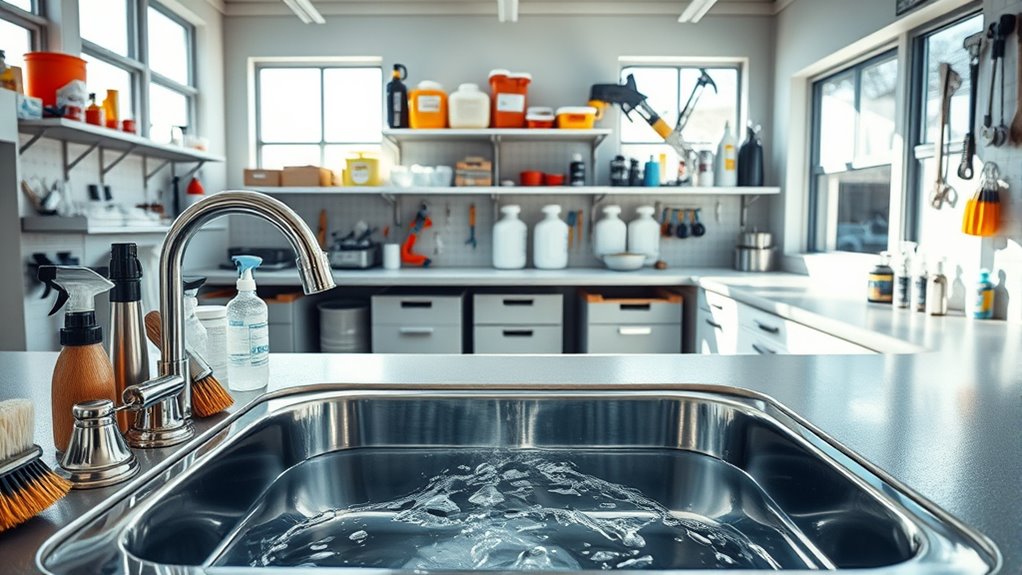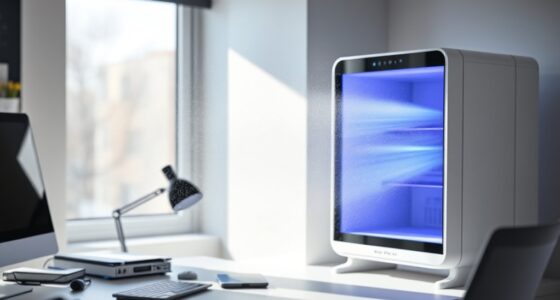To keep your home in top shape, focus on using essential tools and supplies like screwdrivers, microfiber cloths, and multi-surface cleaners, while following safety practices such as unplugging appliances before maintenance. Create a simple schedule for routine tasks like cleaning the kitchen, bathroom, and checking appliances, and stay organized to prevent clutter. Regular preventative measures help avoid costly repairs. Keep up with these basics, and you’ll discover even more tips to maintain your space efficiently.
Key Takeaways
- Establish a safety-first routine by unplugging devices before cleaning and using proper handling to prevent damage.
- Create organized maintenance schedules for weekly, monthly, and seasonal tasks to prevent major repairs.
- Use appropriate cleaning techniques for surfaces and floors to maintain hygiene and prevent surface damage.
- Organize and declutter spaces regularly to facilitate cleaning, reduce dust, and extend the lifespan of belongings.
- Perform preventative maintenance like inspecting pipes, electrical systems, and appliances to ensure efficiency and longevity.
Essential Tools and Supplies for Every Home
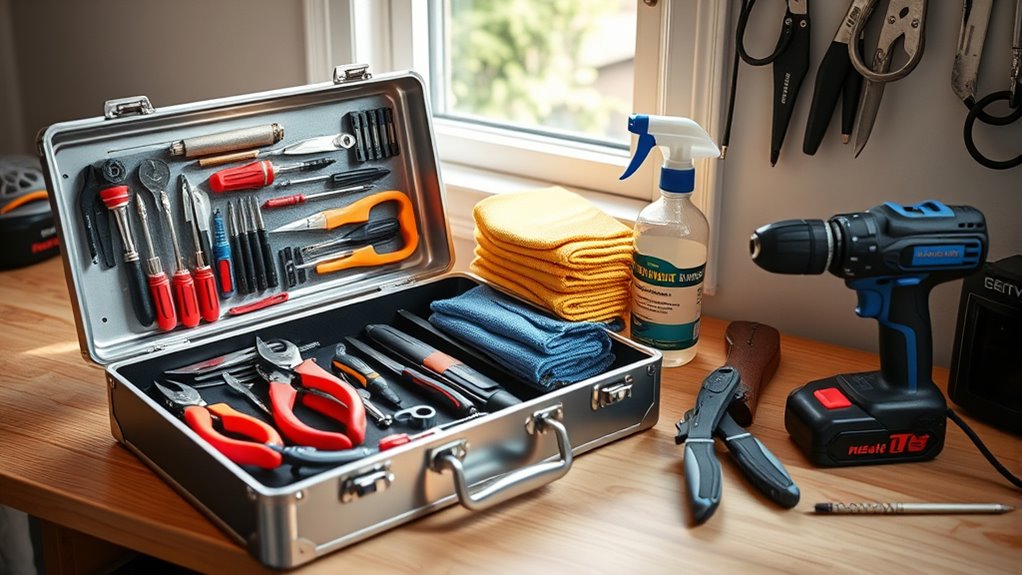
Having the right tools and supplies on hand makes home maintenance much easier. Start with basic essentials like a quality toolkit—screwdrivers, pliers, a hammer, and a wrench. These are crucial for small repairs or adjusting home decor. Keep a variety of cleaning supplies, such as microfiber cloths, multi-surface cleaners, and a vacuum, to keep your space tidy. For gardening tips, include gardening gloves, pruning shears, and a watering can to maintain your outdoor areas. Storing these tools properly ensures quick access whenever needed. Having these supplies ready helps you handle routine tasks efficiently, whether fixing a loose cabinet or sprucing up your garden. Proper tools make upkeep straightforward, saving you time and preventing minor issues from becoming major problems. Understanding the importance of organized storage can further improve your home maintenance routine.
Creating a Simple Maintenance Schedule
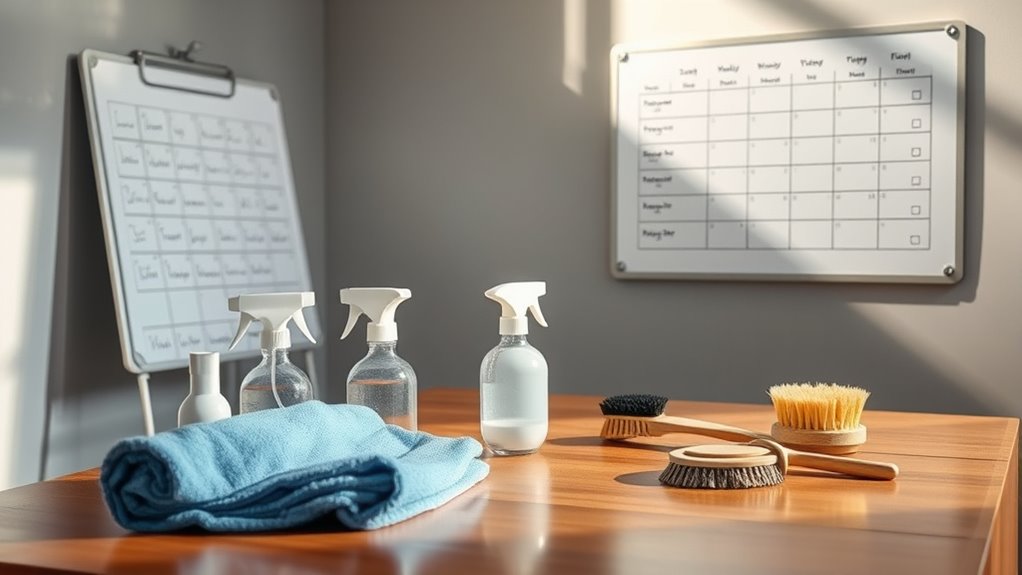
Creating a simple maintenance schedule is essential for keeping your home in good shape without feeling overwhelmed. Start by breaking tasks into manageable routines, such as weekly or monthly chores. Incorporate garden maintenance into your schedule by setting aside time for regular lawn care and pruning, especially during peak seasons. Seasonal cleaning should be a key part of your plan, with specific tasks like deep cleaning carpets or washing windows scheduled for certain times of the year. Use a calendar or planner to track these activities, ensuring nothing gets overlooked. Keep it straightforward—prioritize tasks based on urgency and importance. This approach helps you stay consistent, maintain your home’s condition, and avoid last-minute scrambles. A simple schedule makes home maintenance a routine rather than a burden. Additionally, consider home maintenance schedules that include plumbing and water filtration system checks to ensure your entire home functions smoothly.
Cleaning Your Kitchen: Tips for a Sparkling Space
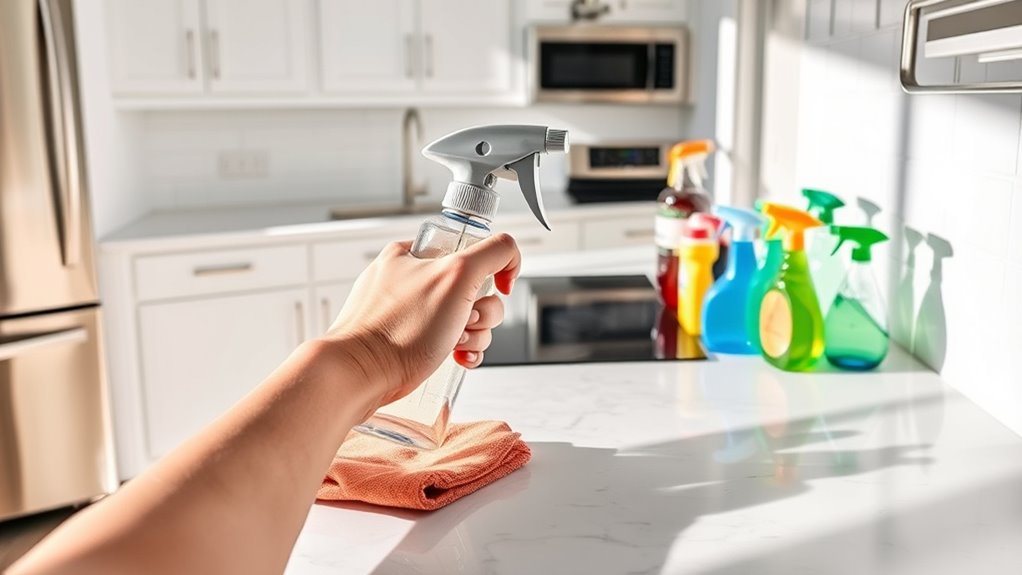
A clean and sparkling kitchen not only looks inviting but also promotes a healthier environment. To achieve this, opt for eco friendly cleaning methods that use natural, biodegradable products. These are effective at removing grime while being safe for your family and the planet. Always choose children safe products, especially when cleaning surfaces your kids might touch or eat from. Regularly wipe down countertops, sinks, and appliances with gentle, non-toxic cleaners to prevent buildup and bacteria. Don’t forget to clean the microwave and refrigerator interiors to eliminate crumbs and spills. Keep a clutter-free space to make cleaning easier and faster. By using eco friendly, children safe products and maintaining a consistent cleaning routine, you’ll ensure your kitchen remains spotless, safe, and welcoming for everyone. Incorporating the latest cleaning techniques from family photoshoot fails can help make your routine more efficient and fun.
Bathroom Upkeep: Keeping Mold and Grime at Bay
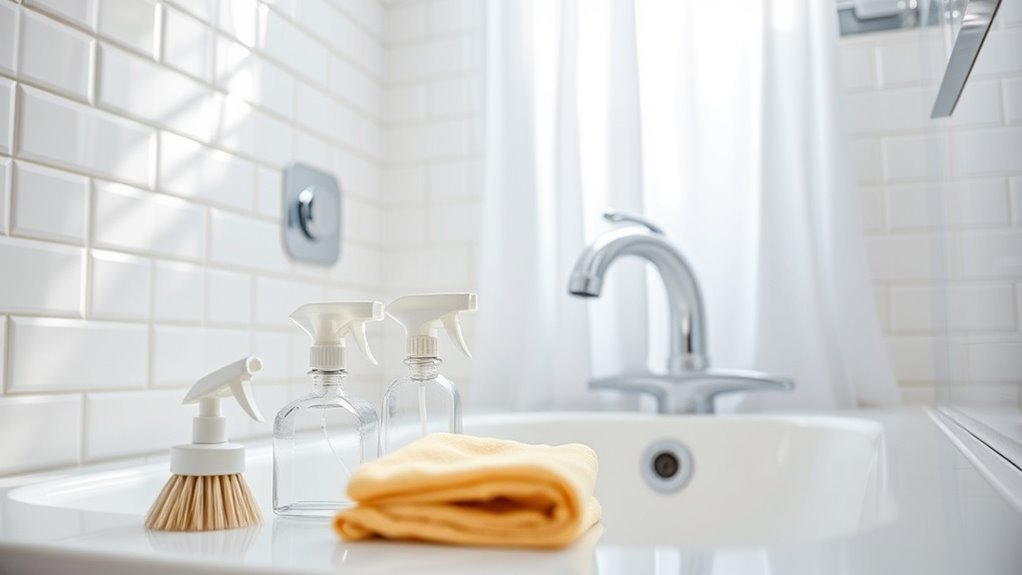
To keep your bathroom mold-free and spotless, you need a consistent routine. Prevent mold growth by controlling moisture and cleaning problem areas regularly. Using effective methods to remove grime will help your bathroom stay fresh and hygienic. Incorporating routine cleaning practices can prevent the buildup of dirt and mold, ensuring long-term cleanliness.
Preventing Mold Growth
Wondering how to keep mold from taking hold in your bathroom? The key is mold prevention through effective moisture control. Make sure to ventilate your bathroom well by using an exhaust fan or opening a window during and after showers. Wipe down wet surfaces like tiles, sinks, and shower curtains regularly to reduce lingering moisture. Fix leaks immediately, as even small drips can create a damp environment perfect for mold growth. Keep humidity levels below 60% with a dehumidifier if needed. Using mold-resistant paint on walls and sealing grout lines also helps prevent mold spores from settling. Consistent moisture management is your best defense against mold. Stay vigilant and incorporate these simple steps to maintain a dry, mold-free bathroom environment.
Regular Cleaning Routine
Establishing a regular cleaning routine is essential for keeping your bathroom free of mold and grime. Consistency prevents buildup and makes maintenance easier. Dedicate a few minutes weekly to scrub surfaces, wipe down tiles, and clean drains. Think of it like garden maintenance—regular care keeps everything fresh and healthy. For outdoor cleaning, you wouldn’t neglect your garden; the same applies here. Incorporating creative practice into your routine can also help find new, efficient cleaning methods that work best for you.
Effective Grime Removal
Regularly removing grime is essential for maintaining a spotless bathroom and preventing mold growth. To achieve this, use a mixture of vinegar and baking soda to tackle soap scum and stains effectively. Spray the solution on surfaces, let it sit for a few minutes, then scrub with a brush or sponge. This not only removes grime but also aids in mold prevention by eliminating the damp, sticky environments mold thrives in. For stubborn stains, apply a commercial stain remover or a paste of baking soda and water, then scrub until the stain lifts. Consistent grime removal keeps surfaces clean and dry, reducing mold risk and maintaining a fresh, hygienic bathroom. Regular upkeep makes cleaning quicker and ensures your bathroom stays mold-free and sparkling. Incorporating effective cleaning techniques can further enhance your bathroom maintenance routine.
Maintaining Your Appliances for Longevity
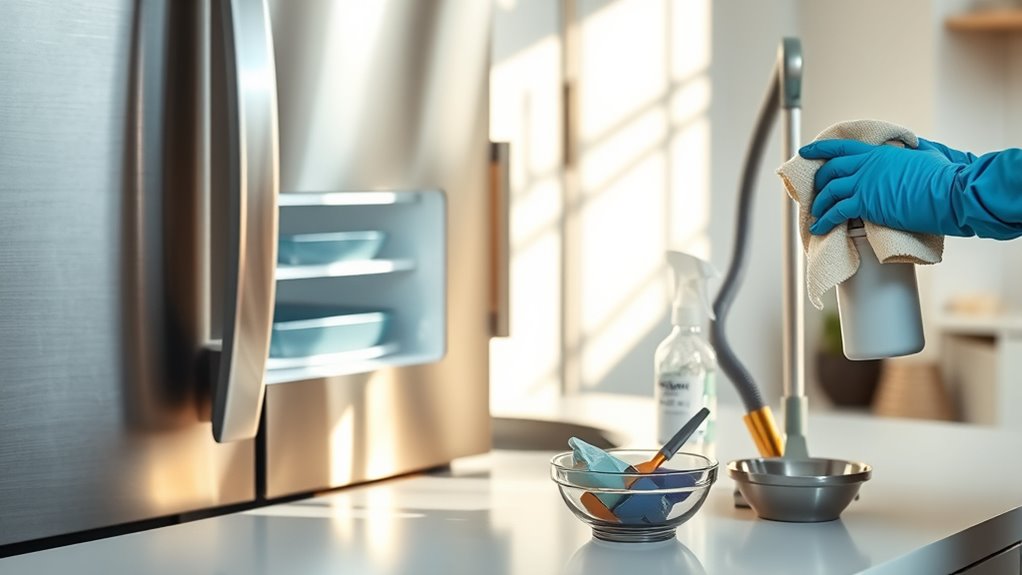
To keep your appliances running smoothly for years, you need to establish regular inspection routines. Using them properly can prevent unnecessary wear and damage. Pay attention to these habits to guarantee your appliances stay efficient and durable. Regularly checking and upgrading components like performance exhaust systems can also help maintain their optimal function.
Regular Inspection Routines
Have you ever wondered how minor issues can turn into costly repairs if left unchecked? Regular inspection routines help you catch problems early, saving money and extending your appliances’ life. Check for loose connections, worn-out parts, or unusual noises. Keep an eye on your home decor to ensure it doesn’t hide signs of damage or pests, which can affect your appliances’ performance. Look for signs of pests, such as droppings or chewed wires, and address them promptly. Clean filters and vents regularly to prevent buildup and improve efficiency. Additionally, monitoring projector components and their condition can prevent unexpected malfunctions. These simple steps keep your appliances running smoothly and help you avoid unexpected breakdowns. Incorporating routine inspections into your maintenance schedule protects your investment and keeps your home safe and functional.
Proper Usage Techniques
Proper usage techniques are vital for extending the lifespan of your appliances. When handling equipment, always follow the manufacturer’s instructions to guarantee proper handling and avoid damage. Using appliances correctly not only improves efficiency but also reduces wear and tear, preventing costly repairs. Prioritize equipment safety by unplugging devices before cleaning or maintenance, and never force parts that don’t move easily. Avoid overloading appliances, which can strain components and shorten their lifespan. Regularly using the correct settings and avoiding misuse helps maintain ideal performance. By practicing proper handling and emphasizing equipment safety, you protect your investments and ensure appliances operate smoothly for years. Proper usage isn’t just about convenience—it’s a fundamental step in keeping your appliances durable and reliable. Proper handling and maintenance practices play a significant role in preventing unnecessary breakdowns and extending appliance longevity.
Tackle Dust and Allergens With Easy Methods
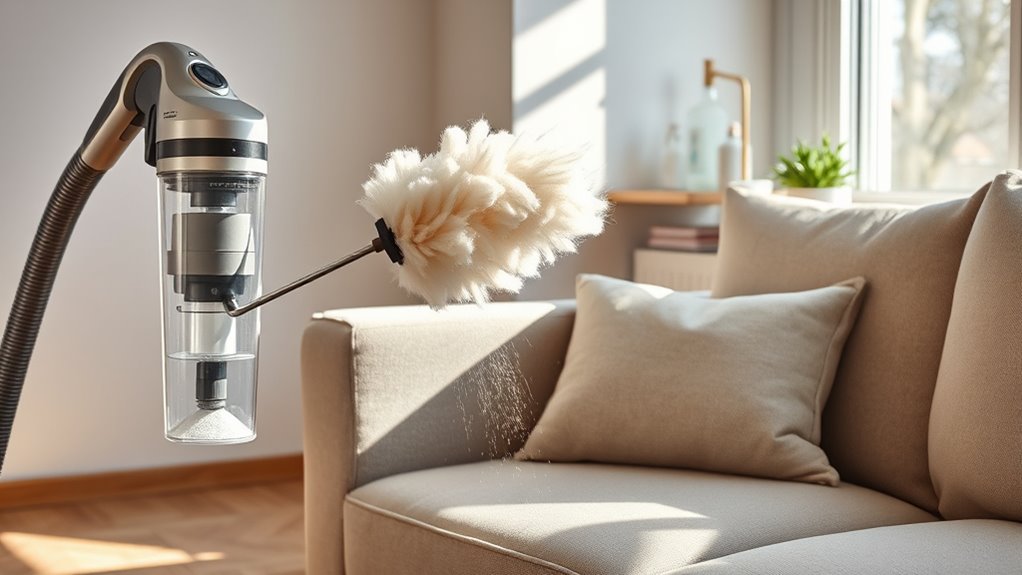
Dust and allergens can quickly accumulate in your home, triggering allergies and respiratory issues if not managed properly. To combat this, use an air purifier with HEPA filters to trap airborne particles effectively. Regularly replace or clean dust filters in your HVAC system to reduce dust buildup and improve air quality. Dust surfaces frequently with a damp cloth to prevent allergens from becoming airborne. Don’t forget to vacuum with a vacuum cleaner that has a high-efficiency dust bag or HEPA filter; this prevents dust from recirculating. Keep clutter to a minimum, as it traps dust and allergens. Additionally, understanding the weights of pinball machines can help you plan safe moves when cleaning or relocating heavy equipment. These simple methods make it easier to maintain a cleaner, healthier environment with less effort. Consistency is key to minimizing dust and allergy symptoms in your home.
Flooring Care: Cleaning Different Surfaces Effectively
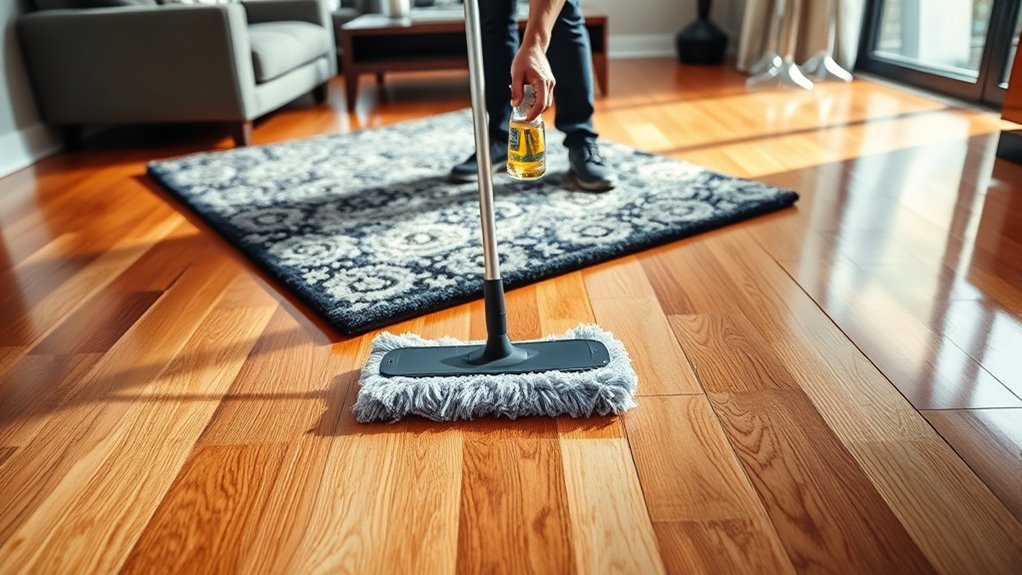
Different flooring surfaces require tailored cleaning methods to keep them looking their best and lasting longer. For wood flooring, use a soft broom or vacuum with a gentle brush attachment to remove debris, then mop with a damp, not soaking, cloth using a wood-friendly cleaner. Avoid excess water to prevent damage. For tile flooring, sweep or vacuum regularly to pick up dirt, then mop with warm water mixed with a mild tile cleaner. Pay attention to grout lines, scrubbing them gently with a soft brush. Both surfaces benefit from routine cleaning to prevent build-up of dirt and grime. Keep in mind that using the right cleaning tools and products helps preserve the integrity of each surface and keeps your floors looking fresh and well-maintained.
Organizing and Decluttering for Ease of Maintenance
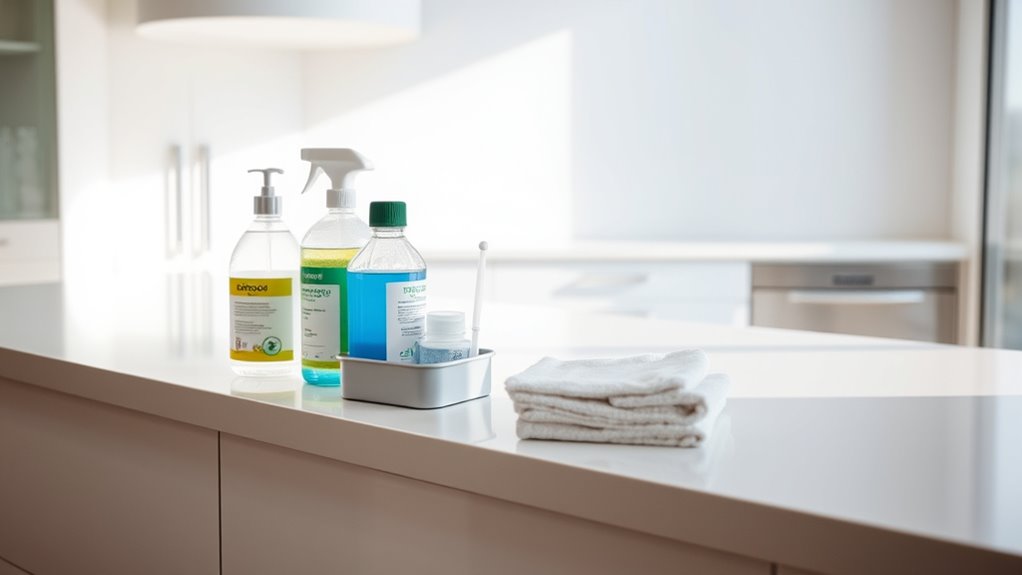
Organizing and decluttering your space makes maintenance much easier and more efficient. When you use effective storage solutions, such as bins, shelves, and drawer organizers, you create designated spots for items, reducing clutter and making cleaning faster. Clutter reduction not only improves the appearance of your space but also minimizes dust and dirt buildup, which can trap grime and require extra effort to clean. Regularly sorting through belongings and disposing of unnecessary items keeps your environment tidy and manageable. Keep surfaces clear and store items in an organized manner so you can easily access what you need without creating messes. By establishing a system for organizing and decluttering, you make ongoing maintenance simpler, save time, and extend the life of your possessions.
Preventative Measures to Avoid Major Repairs
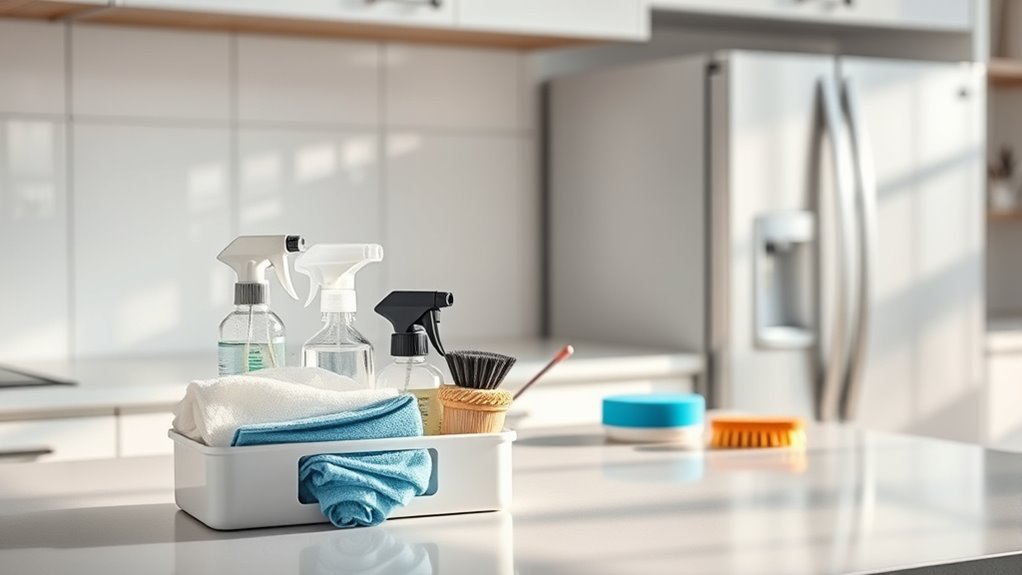
Taking proactive steps to prevent major repairs can save you time and money in the long run. Regular seasonal maintenance is essential for catching issues early before they escalate. For example, scheduling HVAC inspections before winter and cleaning gutters in fall helps prevent costly damage and ensures home safety. Check pipes for leaks and insulate them to avoid freezing in winter. Keep an eye on electrical systems and replace worn-out wiring or outlets. Maintaining appliances and fixtures reduces the risk of breakdowns. By staying ahead with these preventative measures, you reduce emergency repairs and improve your home’s safety. Consistent upkeep not only extends the life of your systems but also provides peace of mind, knowing your home is protected from avoidable problems.
Quick Fixes and When to Call a Professional
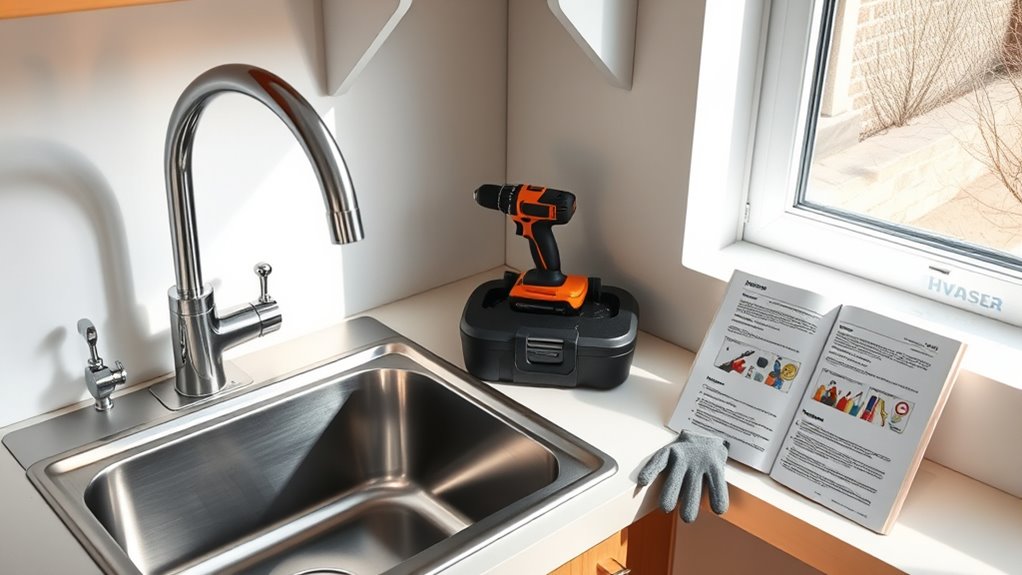
Many minor repairs, like fixing a leaky faucet or replacing a fuse, are simple enough to handle yourself. However, it’s important to recognize signs that indicate you should call a professional, such as persistent problems or safety concerns. Knowing when to do a quick fix and when to seek expert help can save you time, money, and potential injury.
Minor Repairs You Can Handle
While some minor repairs are straightforward enough to handle yourself, it’s essential to know your limits and when to call a professional. For instance, if you notice exposed wiring or flickering lights, prioritize electrical safety by turning off the power and consulting an electrician. Simple fixes like replacing a faulty switch or loose outlet are manageable but avoid working on live circuits. Regularly inspecting for pest entry points, like gaps around pipes or vents, helps prevent infestations, but sealing larger holes or installing barriers may require expert help. Always prioritize safety and recognize when a repair exceeds your skill level. Handling minor issues promptly saves money and keeps your home safe, but don’t hesitate to seek professional assistance for complex or potentially hazardous repairs.
Signs You Need Experts
Knowing when to call in a professional can save you time, money, and potential hazards. If your home automation system isn’t functioning properly or if you’re facing persistent pest control issues, it’s time to bring in experts. Signs include recurring problems despite quick fixes, unusual noises, or visible damage that could worsen without proper repair. For home automation, malfunctioning devices or security system failures require specialized knowledge. Pest infestations that don’t respond to DIY treatments can pose health risks and need professional extermination. Don’t overlook these signs—attempting to fix complex issues yourself may cause further damage or safety concerns. When in doubt, consulting a professional ensures the problem is resolved efficiently and safely, preventing future headaches.
DIY vs. Professional Services
Deciding between a DIY fix and calling in a professional depends on the complexity and severity of the problem. If it’s a minor issue, DIY safety and proper tools can often handle it. However, for more serious or complicated repairs, professional expertise is essential. Consider these points:
- Evaluate the risk involved—if it could cause injury, call a pro.
- Assess your skill level and experience.
- Determine if specialized tools are needed.
- Know your limits—when in doubt, opt for professional help.
Quick fixes are fine for small, straightforward tasks, but don’t hesitate to seek professional services when safety, efficiency, or long-term results are at stake. Recognizing when a problem exceeds DIY capabilities ensures your safety and maintains the integrity of your home.
Frequently Asked Questions
How Often Should I Replace Cleaning Supplies for Optimal Results?
You should replace cleaning supplies regularly to maintain ideal results. Replenishing supplies before they run out ensures you’re always prepared, and paying attention to their shelf life helps prevent using expired products. Check labels for recommended usage periods, and dispose of old or expired items promptly. This proactive approach keeps your cleaning effective and safe, avoiding buildup of bacteria or diminished cleaning power that can occur when supplies are outdated or depleted.
What Are Common Signs That Appliances Need Professional Repair?
Think of your appliances as silent sentinels of your home, showing signs when their watch is waning. If your dishwasher leaks, your fridge struggles to stay cold, or your oven takes longer to heat, these are clear repair indicators. Pay attention to unusual noises or increased energy bills. These signs signal that your appliance’s lifespan is nearing its end, and it’s time to call in a professional before a small problem becomes a costly repair.
How Can I Prevent Pests During Cleaning Routines?
To prevent pests during cleaning routines, you should follow pest proofing tips like sealing cracks and storing food in airtight containers. Regularly clean under appliances and fix leaks to eliminate pest attractions. Use pest prevention techniques such as trash management and maintaining dry, clutter-free spaces. These steps make your home less inviting to pests, helping you keep your environment clean and pest-free effortlessly.
Are Eco-Friendly Cleaning Products as Effective as Traditional Ones?
You get what you pay for, but eco-friendly cleaning products can be just as effective as traditional ones if you choose wisely. Green cleaning options often use natural ingredients that target dirt and grime effectively. With a little research, you’ll find products that match their chemical-laden counterparts in product effectiveness. Plus, they’re safer for your family and the environment, proving you don’t have to compromise cleanliness for sustainability.
What Safety Precautions Should I Follow During Home Maintenance Tasks?
You should always wear personal protective equipment, like gloves and goggles, to prevent injuries. Make certain electrical safety by disconnecting power before working on any wiring or appliances. Keep your workspace clear, follow instructions carefully, and use the right tools for each task. Ventilate the area when using chemicals, and never take shortcuts. Staying cautious helps you avoid accidents and keeps your home maintenance safe and effective.
Conclusion
By staying attentive to your home’s gentle rhythms, you’ll find that small, consistent efforts keep everything running smoothly. Think of maintenance as nurturing a delicate garden—tending it regularly prevents weeds of trouble from taking root. With this no-nonsense approach, your space will stay welcoming and worry-free, allowing you to focus on what truly matters. Embrace these simple habits, and you’ll enjoy a home that quietly flourishes without the need for dramatic measures.
